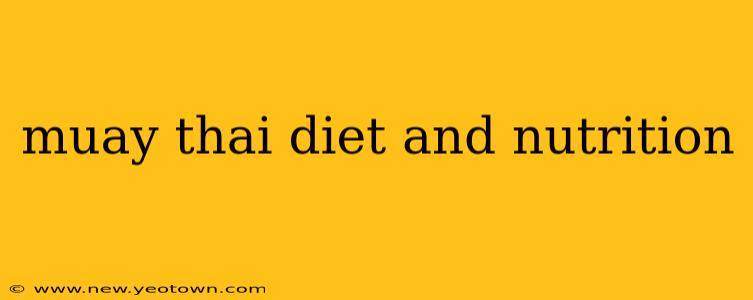Muay Thai, the ancient art of eight limbs, demands peak physical condition. It's a grueling sport requiring explosive power, incredible stamina, and lightning-fast reflexes. But it's not just about the training; fueling your body correctly is just as crucial for success. This isn't just about looking good in the ring; it's about maximizing your performance, minimizing injury, and optimizing recovery. Let's dive into the essential aspects of a Muay Thai diet and nutrition plan.
What Should a Muay Thai Fighter Eat?
This is the million-dollar question! The answer isn't a single magic food but a carefully balanced approach focusing on macronutrients and micronutrients. Your daily intake should be tailored to your training volume, weight class, and individual metabolic needs. However, some core principles remain consistent.
Think of your diet like building blocks for your body:
-
Protein: This is the cornerstone of muscle growth and repair. Aim for around 1.6-2.2 grams of protein per kilogram of body weight (0.7-1 gram per pound). Excellent sources include lean meats (chicken, turkey, fish), eggs, beans, lentils, and protein powders.
-
Carbohydrates: These provide the energy your body needs for intense training sessions. Choose complex carbs like brown rice, quinoa, sweet potatoes, and oats for sustained energy release, avoiding simple sugars that lead to energy crashes. The amount of carbs you need will depend heavily on your training schedule – higher volume training generally necessitates higher carb intake.
-
Fats: Healthy fats are essential for hormone production, nutrient absorption, and overall health. Focus on unsaturated fats from sources like avocados, nuts, seeds, and olive oil. Limit saturated and trans fats.
How Many Calories Should a Muay Thai Fighter Eat?
This is highly individualized and depends on factors like your current weight, training intensity, and goals. Are you trying to gain muscle, lose weight, or maintain your current weight? A registered dietitian or sports nutritionist can help you determine your caloric needs accurately. Tracking your calories and macros using a food journal or app can be beneficial to ensure you're meeting your targets.
What Foods Should Muay Thai Fighters Avoid?
While Muay Thai demands discipline in the ring, it also requires discipline in the kitchen. Minimize or eliminate:
- Processed foods: These are often high in unhealthy fats, sodium, and sugar, offering little nutritional value.
- Sugary drinks: Soda, juice, and energy drinks contribute empty calories and can hinder performance.
- Excessive alcohol: Alcohol dehydrates you and can interfere with recovery.
How to Optimize Hydration for Muay Thai Training?
Hydration is paramount. Dehydration can lead to fatigue, muscle cramps, and decreased performance. Always drink plenty of water throughout the day, especially before, during, and after training. Consider electrolyte drinks, particularly during longer or more intense sessions, to replenish lost electrolytes.
What Supplements Might Benefit Muay Thai Fighters?
While a well-balanced diet should provide most of your nutritional needs, some supplements may be beneficial, but always consult with a healthcare professional before starting any new supplement regimen. These could include:
- Creatine: May improve strength and power.
- Protein powder: A convenient way to increase protein intake.
- Electrolyte supplements: Can aid in hydration, especially during intense training.
- Omega-3 fatty acids: Support overall health and inflammation management.
Are There Specific Dietary Needs Based on Weight Class?
Yes, absolutely. Different weight classes have different nutritional requirements. Lower weight classes often require stricter calorie control and potentially more attention to macro ratios to make weight while maintaining energy and performance. Higher weight classes may need to focus on gaining muscle mass while maintaining lean body composition. Working with a sports dietitian familiar with combat sports is highly recommended.
What is the Best Meal Timing for Muay Thai Training?
Timing your meals strategically around training is key. Consume a balanced meal or snack 2-3 hours before training, providing sustained energy. After training, replenish glycogen stores and promote muscle repair with a meal containing carbohydrates and protein.
Can I Eat Carbs Before Bed?
This is a topic of debate. Some believe that carbs consumed close to bedtime can hinder sleep. Others advocate for a small amount of slow-digesting carbs to support overnight recovery. Experiment to see what works best for your body and sleep patterns.
By carefully considering these aspects of your diet, you can become a more effective, resilient, and healthier Muay Thai fighter. Remember that consistency is key; building good eating habits will pay dividends in the long run, both inside and outside the ring. Consult with a qualified professional for personalized guidance.

